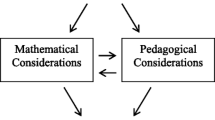Abstract
This paper [1] collects syllabuses, teacher intentions, curricula and lesson plans under a general term “agenda.” First it explores the ways in which agenda do and do not relate to those classroom settings for which they claim to be agenda. It is suggested that curriculum innovators legislate for the classroom on the basis of idealized schemes and systems, and that such a basis contributes to the troubles schemes encounter during implementation in the classroom. Classrooms have systems of their own—systems of interaction—and if schemes for them do not have an empirical basis in those classroom systems, the systems will distort those schemes. The main part of the paper is given over to describing some gross features of the classroom system particularly: its a-topical, formal, collaborative, unfolding, orderly, busy, instantaneous, judgemental, identity related and questioning characteristics. The last section argues for and gives examples of educational issues such as evaluation, indoctrination, and teacher competence being discussed in terms of the classroom system in which they occur.
Similar content being viewed by others
References
Anderson, D. C. (1978a). “Curricula as Implicative Descriptions of Classrooms: A Case of Conspicuous Formal Irrelevance.” Health Education Research Papers, University of Nottingham.
Anderson, D. C. (1978b). “Curriculum innovation and local need,” Journal of Curriculum Studies (in press).
Apple, M. W. (1972). “The adequacy of systems management procedures in education,” Journal of Educational Research, 66: 10–18.
Coulter, J. (1976). “Harvey Sacks: a preliminary appreciation,” Sociology, 10: 509–606.
Cowley, J. C. P. (1977). “Organization and objectives in secondary school health and social education,” Journal of the Institute of Health Education, 15: 19–23.
Flanders, N. A. (1966). Interaction Analysis in the Classroom: A Manual for Observers. University of Michigan, School of Education.
Garfinkel, H. (1967). Studies in Ethnomethodology. Englewood Cliffs, New Jersey: Prentice Hall.
Garfinkel, H. and Sacks, H. (1970). “On the formal structures of practical actions,” in McKinney, J. C. and Tiryakian, E. A. (eds.), Theoretical Sociology: Perspectives and Developments. New York: Appleton-Century-Crofts.
Holt, J. C. (1964). How Children Fail. New York: Pitman.
Jefferson, G. (1972). “Side sequences,” in Sudnow, D. (ed.), Studies in Social Interaction. New York: Free Press.
Macdonald-Ross, M. (1973). “Behavioural objectives—a critical review,” Instructional Science, 2: 1–52.
Mehan, H. et al. (1978). “Structuring school structure,” Harvard Educational Review, 48: 32–64.
Peters, R. (1973) “Farewell to aims,” London Educational Review, 2 (3): 1–4.
Sacks, H. (1963). “Sociological description,” Berkeley Journal of Sociology, 8: 1–16.
Sacks, H. (1972). “On the analyzability of stories by children,” in Gumperz, J. J. and Hymes, D. (eds.), Directions in Sociolinguistics: The Ethnography of Communication. New York: Holt, Rinehart and Winston.
Sacks, H., Schegloff, E. A. and Jefferson, G. (1974). “A simplest systematics for the organization of turn taking for conversation,” Language, 50: 696–735.
Schegloff, E. A. (1972). “On some questions and ambiguities in conversations.” Paper prepared for the Rutgers University Conference on Linguistics and Language Education, April.
Weider, D. L. (1973). Language and Social Reality. The Hague: Mouton.
Author information
Authors and Affiliations
Additional information
I acknowledge the helpful comments of project colleagues, collaborating teachers and W. W. Sharrock.
Rights and permissions
About this article
Cite this article
Anderson, D.C. The formal basis for a contextually sensitive classroom agenda. Instr Sci 8, 43–65 (1979). https://doi.org/10.1007/BF00054981
Issue Date:
DOI: https://doi.org/10.1007/BF00054981




